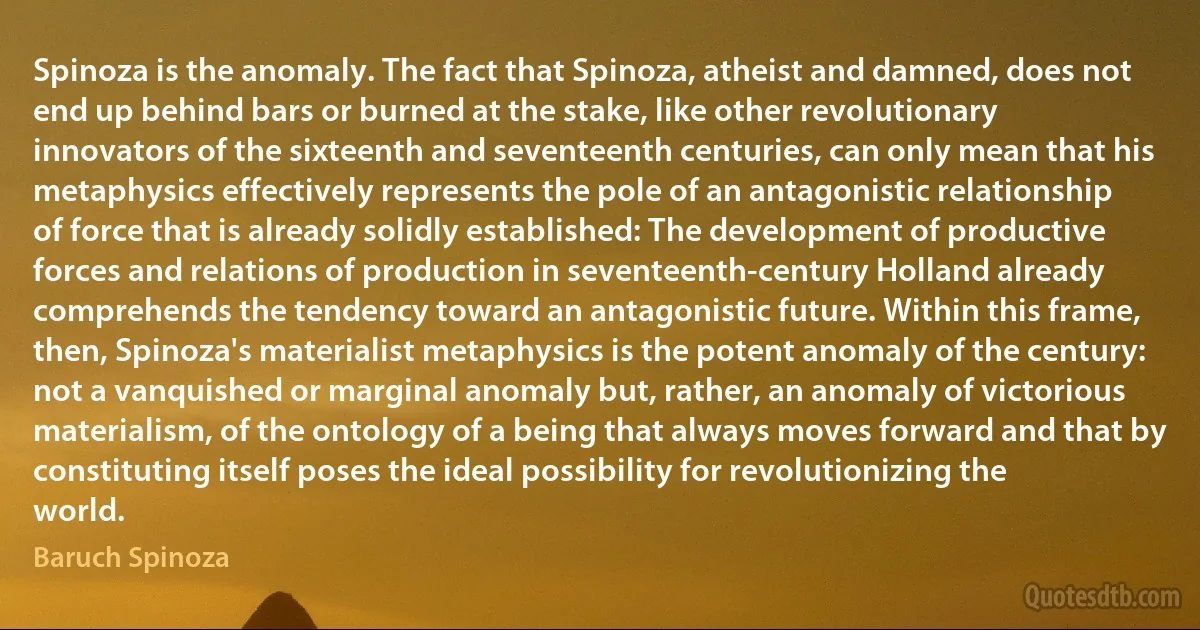
Spinoza is the anomaly. The fact that Spinoza, atheist and damned, does not end up behind bars or burned at the stake, like other revolutionary innovators of the sixteenth and seventeenth centuries, can only mean that his metaphysics effectively represents the pole of an antagonistic relationship of force that is already solidly established: The development of productive forces and relations of production in seventeenth-century Holland already comprehends the tendency toward an antagonistic future. Within this frame, then, Spinoza's materialist metaphysics is the potent anomaly of the century: not a vanquished or marginal anomaly but, rather, an anomaly of victorious materialism, of the ontology of a being that always moves forward and that by constituting itself poses the ideal possibility for revolutionizing the world.
Baruch SpinozaRelated topics
anomaly behind century development end force forward frame future holland marginal materialism materialist mean metaphysics ontology possibility production seventeenth sixteenth tendency world relations movesRelated quotes
You feel chilled because you have no character. You're a depressing assemblage of pop culture influences and cancelled emotions, driven by the sputtering engine of only the most banal form of capitalism. You spend your life feeling as if you're perpetually on the brink of being obsolete - whether it's labour market obsolescence or cultural unhipness. And it's all catching up with you. You live and die by the development cycle. You're glamorized drosophila flies, with the company regulating your life cycles at whim. If it isn't a budget-driven eighteen-month game production schedule, it's a five-year hardware obsolescence schedule. Every five years you have to throw away everything you know and learn a whole new set of hardware and software specs, relegating what was once critical to our lives to the cosmic slag heap.

Douglas Coupland
WHAT HAPPENS AFTER DEATH?
When a human soul goes out of the body, some great mystery happens. For if it is guilty of sins, then there come hordes of demons, evil angels and dark forces, take that soul and drag it to their side.
No one should be surprised at that, because if a man surrendered and fell prey to them while still alive in this world, will not they have even greater control over him and enslave him when he departs from this world?
As for the other, the better part of people, something different happens to them. There are Angels around the holy servants of God in this life; the holy spirits surround them and protect them; and when their souls are separated from the body, the choir of Angels welcomes them into their fellowship, into a bright life, and thus leads them to the Lord.

Macarius of Egypt
Towards the end of the twelfth century, while Western Europe was still wavering between a dying Roman influence and a dawning Gothicism, preliminaries to a medieval era which would make possible the development of a world-wide humanism, Asia had already lived through her classical period and, sinking into decay, was preparing to face a long period of political and spiritual unrest. While India was beginning to suffer under the yoke of the victorious Mussulman, who had come down on her from the mountains of Afghanistan and the plains of Iran, and while the domination of the Khmers was reaching its climax at Angkor, China, under pressure from the barbarians of the north, was withdrawing to the south where the Song empire, thinking itself safe from invasions, continued to live a life of luxury.

Louis Frédéric
The Scottish Communist is a much misunderstood person. When he is a true Caledonian, and not a Pole or an Irishman, he is simply the lineal descendant of the old Radical. The Scottish Radical was a man who held a set of inviolable principles on which he was entirely unable to compromise. It did not matter what the principles were; the point was that they were like the laws of Sinai, which could not be added to or subtracted from. When the Liberal party began to compromise, he joined Labour; when Labour began to compromise, by a natural transition he became a Communist. Temperamentally he has not changed. He is simply the stuff which in the seventeenth century made the unyielding Covenanter, and in the eighteenth the inflexible Jacobite. He is honesty incarnate, but his mind lacks flexibility.

John Buchan
Rawls resorted to Hegel in his internal reflections on a constitutional state. On the plane of inter-state relations, Kant remained his philosopher of reference, as the theorist of conditions for a perpetual peace. So too for Habermas. But since Kant failed to envisage the necessary legal framework for a cosmopolitan order, as it started to take shape through the permanent institutions of the United Nations, Habermas, when he came to review the progress made since 1945, also looked towards the philosopher of objective idealism. Measured against the sombre background of the disasters of the first half of the twentieth century, he decided, ‘the World Spirit, as Hegel would have put it, has lurched forward'. As we have seen, Bobbio was responsible for the most pointed appeal to Hegel of all. In one sense, he was more entitled to do so.

Perry Anderson
